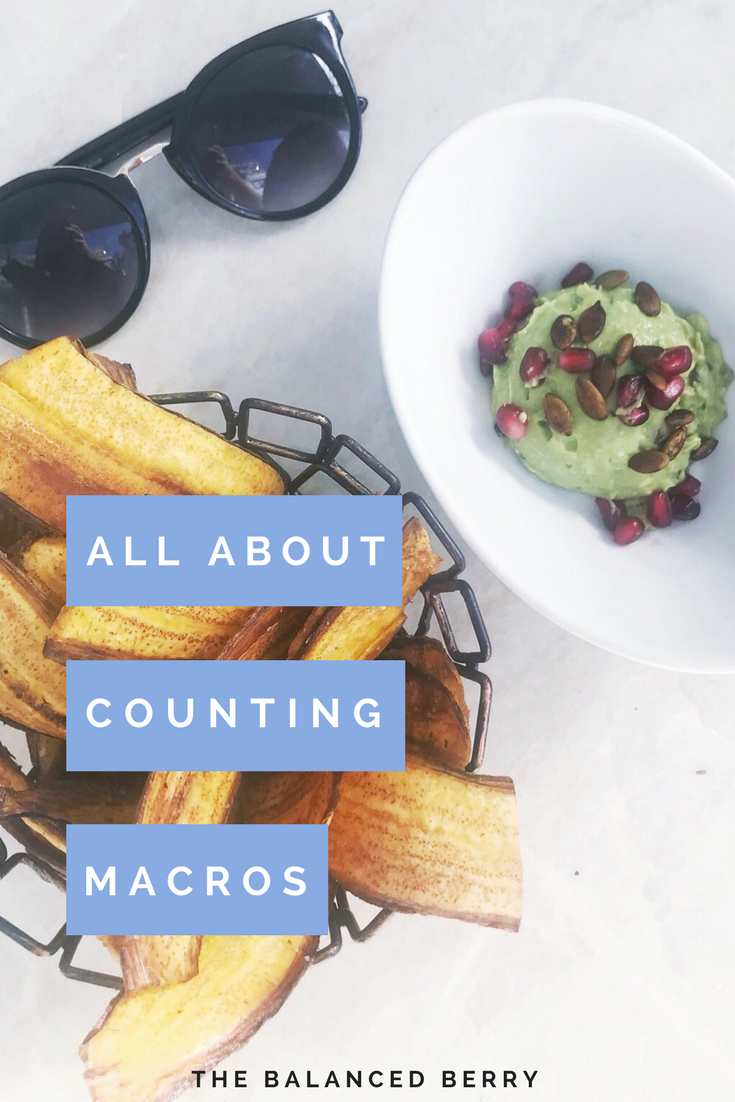
Wondering what macros are and if you should be tracking them? This post breaks down what you need to know about tracking macros in an easy-to-understand way.

Disclaimer: This blog post is not to take the place of advice from a Doctor or Registered Dietitian. Please talk to your doc or an RD before making any dietary changes. <3
A few weeks ago I hosted an online workshop all about working out and eating well even when life gets crazy busy. During the meal prep portion, I mentioned macronutrients (aka macros) and received a ton of questions about what they were and if it was important to understand what they are. Since that wasn’t the focus and intention of the workshop, I didn’t dive very deep on the topic but wanted to save it for a blog post to have an easy-to-understand resource.
What are macros?
The term “macros” is short for “macronutrients” – nutrients the body requires in (relatively) large amounts and includes proteins, carbohydrates, and fats. All foods are made up of macronutrients in varying proportions and quantities. Macros can influence many processes in the body, including digestion, hormone production, body composition (ratio of lean muscle mass vs. body fat), and more. Calorically speaking, protein has four calories per gram, carbohydrates have four calories per gram, and fats have nine calories per gram.
Tracking or counting macros is a popular practice in the fitness world, and is seen as an alternative approach to traditional calorie counting.
What is macro tracking?
Essentially, when an individual tracks their macros they are tracking how many grams of protein, carbohydrates, and fat they consume each day. For many people who track macros, they are aiming to reach a specific ratio to support their body composition goals.
Macro counting/tracking became popular a few years back thanks in large part to the bodybuilding community on Instagram and the IIFYM (if it fits your macros) method. IIFYM or “flexible dieting” revolves around hitting a specific macronutrient ratio, regardless of what foods you consume to reach it. Most people who count or track macros closely log their food in an app like MyFitnessPal to facilitate the process.
Should you track your macros?

#TEAMWFM
That is a really personal question and completely depends on your goals and any history of disordered eating.
If you are recovering from or have a history of disordered eating and feel the tracking or counting could be triggering, I’m going to give this a firm NO. Do not recommend.
For the average Jane (who does not have a history of disordered eating) I would not recommend closely tracking or counting macros for the long-term. Doing so makes eating and wellness quantitative, instead of qualitative. It could be a helpful approach for a short amount of time (i.e. no more than a few weeks) to better understand how your body feels and how you perform when consuming different ratios of nutrients.
I’m also going to say that I personally don’t believe all macronutrients are created equal. Yes, both a cookie and a banana are carbohydrate-dense and have a decent amount of sugar, but that doesn’t make them one and the same. Don’t get me wrong, cookies are delicious, and if you want a cookie, by all means, eat it. Savor it. Enjoy it. But a cookie having roughly the same amount of carbs as a banana doesn’t make it comparable from a nutritional standpoint (hello, potassium, fiber, magnesium… 🍌🙋🏾).
Instead of macro counting/tracking, I prefer to use the term “macro awareness” – which to me feels like a more intuitive approach. Essentially when I’m practicing macro awareness, it means I have a baseline that I know works well for my body, and that I’m able to eat in a way that helps me still reach/maintain my goals from a portion-based approach. At the end of the day, it’s all about awareness and understanding how different foods make me feel, not rigidity.
Your Turn:
Do you have experience with tracking macros or do you prefer a more intuitive approach?

Good morning! I’m glad I saw this and gave this a read! I had a really tough day yesterday on finding my balance with exactly this topic. I like how you mentioned “macro awareness.” I feel like I’ve been trying to find a term for this concept since I find this idea has worked well-ish for me! Balancing out the macros throughout the day yet eating all the good foods and going with what I’m craving. The one thing I realized I need to work on with this concept, are the food rules that I come up with and drive myself nuts over! It’s so annoying and exhausting. It’s one of the things I’m diving into more this week. Thoughts on food rules and macro awareness? Have a happy Monday! <3
Hi Ali! First of all, I really hope your week gets better – sending good vibes your way. Second, I’m so glad the term macro awareness resonates with you! For me, I don’t really follow any food rules and use my energy level as the biggest gauge to track macro awareness. If I feel energized and even-keeled, I know I’m on the right track. If my energy is low, I probably went a little too hard with the carbs. If I’m feeling too full and sluggish, I probably overdid the fats. If I have a headache, I probably didn’t have enough fat…
All of our bodies are so different, but I’ve learned to associate different ways my body feels with different nutrients, and have been able to find balance that way. I do love this topic though, and would be happy to chat further about it!
I’m in a similar boat! I don’t stick to macro counting, mostly because I have a history with disordered eating and whenever I try to track my food, I end up eating dangerously too little (even though I KNOW I should be eating 1500 cals a day, minimum). So I have a very loose idea of macros and I try to get an appropriate level of protein, carbs, and fat with each meal…but who knows if I’m hitting some magical “numbers”. 😉 It works for me, and that’s what counts!
Yes! As long as you feel good, that’s all that matters <3